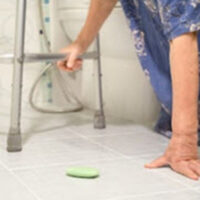Slip and Fall Risks for Nursing Home Residents

Nursing home residents, many of whom are elderly and struggle with serious medical conditions, are at risk of sustaining physical injuries if they slip and fall. To mitigate this risk, nursing homes in Florida are required to comply with certain guidelines when it comes to protecting residents from this type of accident. Unfortunately, many nursing homes fail to take these steps, endangering elderly or ill residents across the state. It is, however, possible to hold these negligent nursing homes accountable for failing to protect the health of their residents by filing a civil claim against them in court, so if your loved one was recently injured in a slip and fall accident in a nursing home, you should reach out to an experienced Fort Lauderdale medical malpractice lawyer who can walk you through your legal options.
Slip and Fall Injuries
Slip and fall accidents can have devastating consequences for nursing home residents, many of whom are more fragile and generally slow to heal. In fact, the Centers for Disease Control and Prevention (CDC) estimates that one out of every five falls involving an elderly individual results in a serious injury, such as broken bones, head trauma, and spinal cord injury. Residents are also at risk of developing a fear of falling, which could cause them to further limit their physical activities. This in turn, can lead to reduced mobility and a loss of fitness, which ultimately increases a person’s risk of falling in the future. Reduced physical functioning can also cause other mental and physical changes that can affect a person’s overall health. It is especially important, with so much at stake, for nursing homes to take precautionary measures to protect residents.
Preventing Falls
Both state and federal law require nursing homes to take precautionary measures to protect their residents from falling. This includes:
-
Providing residents with proper shoes and walking aids or wheelchairs;
-
Addressing hazards that could endanger residents, such as poor lighting, slippery floors, loose or torn carpeting, or uneven flooring ;
-
Ensuring that bed heights are correct and that employees receive proper training on transferring residents from bed to wheelchair;
-
Treating patients with conditions that could increase their fall risk, including poor balance or dizziness attributable to low or high blood pressure or cardiac arrhythmias;
-
Installing handrails and grab bars in areas where residents are more likely to slip, such as showers, bathrooms, and hallways; and
-
Conducting regular risk assessments for residents, including an assessment of each resident’s general physical health and whether they are taking medications that could increase their risk of falling, including sedatives, anti-anxiety medication, and medicine that affects the central nervous system.
While many nursing homes are careful to take these preventive measures to protect residents, an alarming number do not. Fortunately, these facilities can be held liable for damages if their failure results in a resident’s injury.
Set Up an Initial Consultation Today
If your loved one was recently injured in a fall while residing in a nursing home, please call 954-566-9919 to explore the legal options available to you with one of the dedicated medical malpractice lawyers at Boone & Davis today.
Resource:
cdc.gov/homeandrecreationalsafety/falls/adultfalls.html
